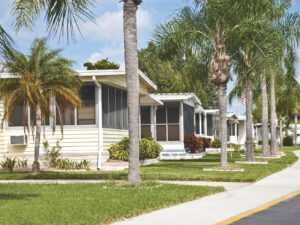By Lenore T. Brakefield and Cameron G. Woodward
 Many people like the idea of living in Florida during winter months. And while this idea seems nice in theory, it can be cost prohibitive for many. Mobile home parks offer a more affordable alternative to purchasing traditional housing. Mobile home parks come in a few different variations, and it is important to remain cognizant of the differences. There are pros and cons of each type that should be considered – namely, the amount of money you want to spend and the amount of control (and responsibility) you are looking for. The three main types of these mobile home parks are: land rental, land ownership, and cooperatives.
Many people like the idea of living in Florida during winter months. And while this idea seems nice in theory, it can be cost prohibitive for many. Mobile home parks offer a more affordable alternative to purchasing traditional housing. Mobile home parks come in a few different variations, and it is important to remain cognizant of the differences. There are pros and cons of each type that should be considered – namely, the amount of money you want to spend and the amount of control (and responsibility) you are looking for. The three main types of these mobile home parks are: land rental, land ownership, and cooperatives.
In a land rental mobile home park, an individual or an entity owns the real property that comprises the park. The individual residents own their home but not the land upon which their home sits. The land, or lot, is rented to each resident from the landowner, or park owner. These types of parks have certain benefits that go along with them. For example, residents do not have to invest additional capital to purchase the land, only their mobile home. Additionally, these types of parks are generally run by professional management companies retained by the landowner and the parks amenities are maintained and operated by this management company. There are downsides, however, as a tenant, the resident typically has little say in how the park is managed. As is the case in most lease agreements, should the resident fail to make the monthly rental payments, he or she can be evicted from the park. With this type of ownership arrangement, mobile homes are not considered an improvement to the real property and maintain vehicle registration and tags. This means taxes for the mobile home are paid to Florida’s Department of Motor Vehicles.
In a landownership mobile home park, residents not only own their mobile home, but also the land upon which it sits. In this type of park, the residents are typically members of a homeowner’s association (HOA) which governs the park. As members of the association, residents are obliged to pay assessments to cover the costs of operating the mobile home park, as well as any special assessments that may be necessary due to unforeseen expenses. One of the benefits of this type of mobile home park is that it affords residents the most rights. Typically, lots have a specific legal description detailing the dimensions and location. In addition, residents, as members of the association, may run for the board of directors, attend board meetings and vote at membership meetings, giving residents a voice in how the mobile home park is managed. With this type of ownership, mobile homes are considered an improvement to the real property and taxed by the county tax collector. Florida’s Department of Motor Vehicles no longer regulates these mobile homes, as the vehicle tags should be retired.
In a cooperative mobile home park, the mobile park land is owned by a corporation and the residents are shareholders of that corporation. With this type of ownership, residents are given a lease for their individual lots but still have an ownership interest in the real property. This form of park ownership has its drawbacks, however, as a cooperative, associations are not required (although some do) to have legal descriptions that are accurate enough to ascertain where each lot begins and ends. This can create problems and boundary issues between neighbors.
No matter what type of mobile home park you choose to live in, the professionals at Woodward, Pires & Lombardo, P.A. can help you understand the pros and cons and aid you in your purchase and any dispute you may have after your purchase.
Woodward, Pires & Lombardo, P.A
Naples Office:
3200 Tamiami Trail N, Ste 200
Naples, FL 34103
239-649-6555
Marco Island Office:
606 Bald Eagle Dr, Ste 500
Marco Island, Fl 34145
239-394-5161









